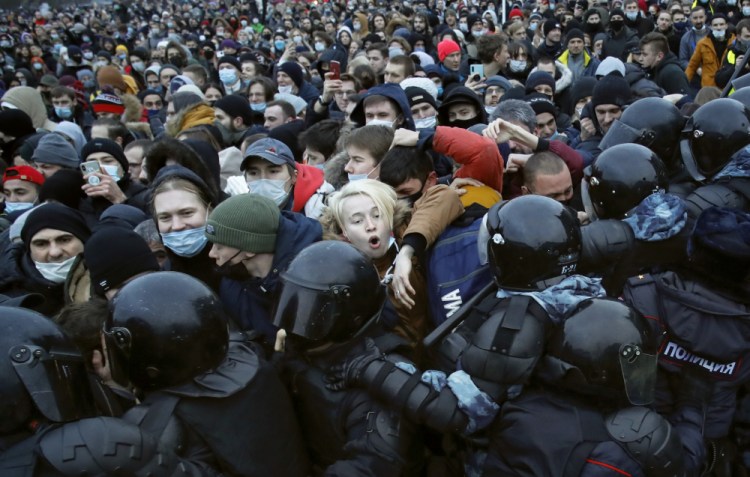MOSCOW — Allies of jailed Russian opposition leader Alexei Navalny, who faces years in prison, are calling for new protests next weekend to demand his release, following a wave of demonstrations that turned out thousands across the country in a defiant challenge to President Vladimir Putin.
Mass rallies took place Saturday in over 100 cities in what observers said were the largest in years, and Navalny’s supporters urged protesters to keep up the pressure.
Navalny strategist Leonid Volkov tweeted Monday for more demonstrations on Jan. 31 in “all Russian cities. … For Navalny’s freedom. For our freedom. For justice.”
During Saturday’s protests, over 3,700 people were detained, according to OVD-Info, a human rights group that monitors political arrests. The group said the number was a record in its nine years of work. More than 1,400 occurred in Moscow alone — also a record, according to Russian media.

In this image taken from video released by Navalny Life Youtube channel, Russian opposition leader Alexei Navalny speaks as he waits for a court hearing in a police station in Khimki, outside in Moscow, Russia, Monday, Jan. 18. A judge has ordered to remand Russian opposition leader Alexei Navalny in custody for 30 days, his spokeswoman Kira Yarmysh said on Twitter. The ruling Monday concluded an hours-long court hearing set up at a police precinct where the politician has been held since his arrest at a Moscow airport Sunday. Navalny Life youtube channel via AP
Authorities launched more than a dozen criminal investigations in Moscow, St. Petersburg and other Russian cities on charges of inciting unrest, involving minors in illegal activity, violence against police, blocking roads, hooliganism and damaging property. Navalny’s team said Russia’s Investigative Committee also is probing violations of virus-related restrictions.
Dozens of Navalny associates in various cities were detained in the days before the protests.
Alexander Peredruk, senior partner of the Apologia of Protest legal aid group involved in the defense of over 1,000 detainees from the Saturday protests, called the authorities’ response “unprecedented.”
Navalny, an anti-corruption campaigner and Putin’s fiercest critic, was arrested Jan. 17 as he returned to Russia from Germany, where he had spent nearly five months recovering from nerve-agent poisoning that he blames on the Kremlin.
He was ordered jailed for 30 days but faces years in prison, with authorities accusing him of violating the terms of a suspended sentence in a 2014 conviction for financial misdeeds. Navalny has said the conviction was politically motivated.
Navalny’s arrest and the detention of demonstrators sparked outrage both at home and abroad. Some Western officials suggested imposing additional sanctions on Russia for its jailing of Navalny.
“The German government condemns the disproportionately hard action by Russian security forces against peaceful protesters, condemns the use of force against peacefully demonstrating citizens,” said German Chancellor Angela Merkel’s spokesman, Steffen Seibert. He called for the immediate release of Navalny and the demonstrators, saying the crackdown was “another example of the extremely problematic treatment of dissenters in the Russian Federation.”
In Russia, public indignation was further fueled by an investigation Navalny’s team released into what they called “Putin’s palace.” A two-hour video posted on YouTube on Jan. 19 alleged a lavish “palace” was built for Putin on the Black Sea through an elaborate corruption scheme. It has since received over 86 million views.
The Kremlin has denied the estate had anything to do with the president. Speaking to students via video on Monday, Putin himself addressed the allegations, calling them an attempt to “brainwash our citizens” and saying that “none of what is mentioned there as my property has never belonged, and doesn’t belong, to me or my close relatives.”
Asked about Saturday’s protests, Putin said that “all people have the right to express their point of view within limits, outlined by law.” He referenced the Jan. 6 attack on the U.S. Capitol and said that those taking part in it were facing “between 15 and 25 years, as if for domestic terrorism.”
“They also came out with political slogans. But outside the law. Why should everything outside the law be allowed here? No,” Putin said.
The Russian protests and crackdown appeared to have further strained Russia-U.S. relations.
U.S. State Department spokesman Ned Price on Saturday condemned “the use of harsh tactics against protesters and journalists” and urged authorities to release Navalny and “all those detained for exercising their universal rights.”
Kremlin spokesman Dmitry Peskov accused Washington of interfering with Russia’s “internal affairs,” after the U.S. Embassy in Moscow put a warning on its website detailing times and places of rallies in different Russian cities and urging U.S. citizens to avoid them.
On Monday, Russia’s Deputy Foreign Minister Sergei Ryabkov lodged a protest to the U.S. Ambassador John Sullivan in connection to “social media posts in support of unlawful rallies” by the U.S. Embassy in Moscow.
The ministry said it has also deemed the statement of the U.S. State Department spokesman “inappropriate.”
Send questions/comments to the editors.



Success. Please wait for the page to reload. If the page does not reload within 5 seconds, please refresh the page.
Enter your email and password to access comments.
Hi, to comment on stories you must . This profile is in addition to your subscription and website login.
Already have a commenting profile? .
Invalid username/password.
Please check your email to confirm and complete your registration.
Only subscribers are eligible to post comments. Please subscribe or login first for digital access. Here’s why.
Use the form below to reset your password. When you've submitted your account email, we will send an email with a reset code.